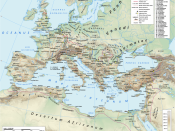[Type text] [Type text] [Type text]
HI0407
13038822
To what extent is it accurate to view empires as civilisers?
This essay aims to encompass the rise of the Roman Empire, civilisation as a topic and then whether it is apt to conclude that it was the empire itself that drew about the change in citizens being classed as "civilised". Firstly, it would be prudent to determine what "civilised" actually meant at the time of the Roman Empire, or more precisely "cultus" and "cultura" as was more commonly known during that time period. It is often argued that an empire is needed in order to sustain international stability and prevent transnational anarchy. Nevertheless, the counterargument presents itself in that an empire relies upon power and the consequential relationship that then forms between said empire and its citizens, in which the fundamental foundation of stability depends fully on inequality. The question stated above finds support in various places, for example the cited works of Münklers, who states that empires "see themselves as creators and guarantors of an order that ultimately depends on them".
This quote is an appropriate starting point as it allows the ability to expand upon it further in order to determine whether there is any credible substance behind it. [1: Bruze Mazlish, 'Civilization and its Contents' (Stanford, CA, 2004), pp. 1-19][2: Ferguson, Niall, 'Colossus: The Rise and Fall of the American Empire' (London, 2005) p. xxviii ][3: Hall, Catherine, Broadcast 'The Empie Strikes Back", BBC Radio 4, 7 April 2005][4: O'Reilly, Mark J. "Empires: Varying, Enduring, Controversial." International Studies Review 14, no. 1 (2012): pp. 152-156.]
The Roman Empire was one of great power, stretching a pronounced distance of approximately five million square kilometres by the end of the second century AD. Arising from the Punic conflicts,


